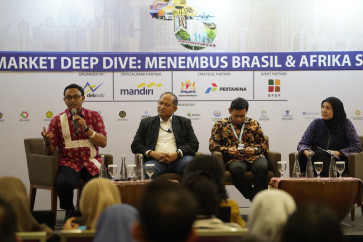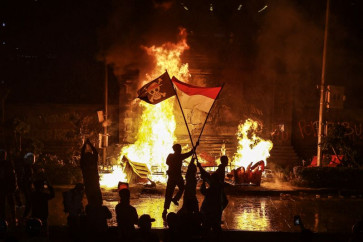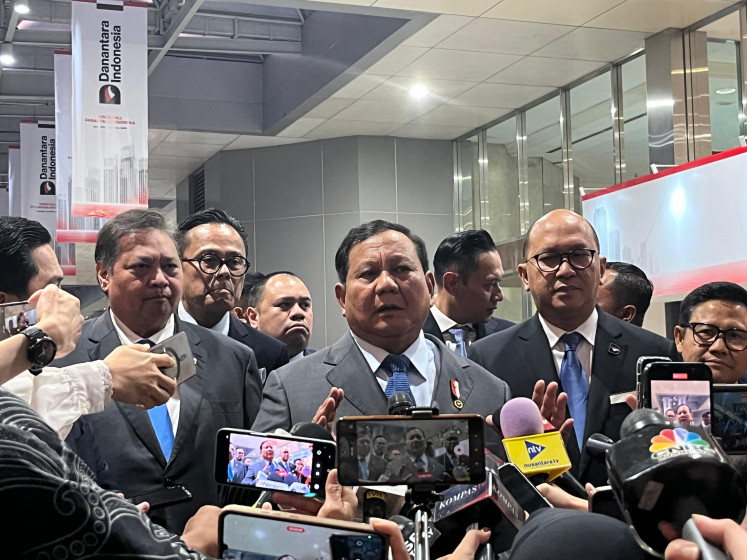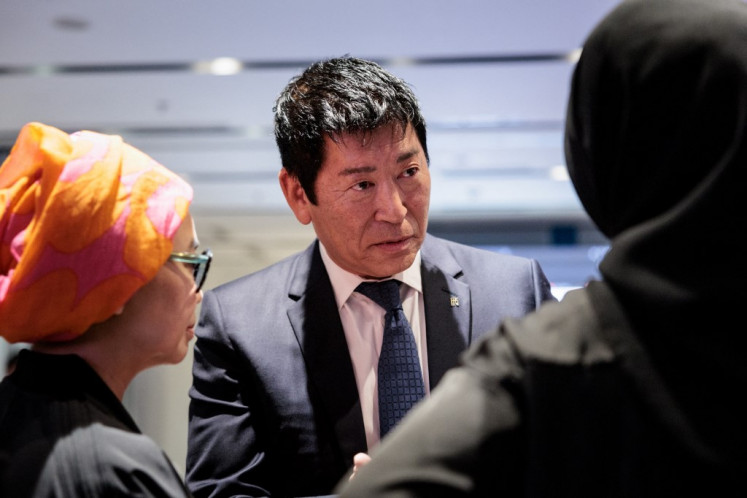Popular Reads
Top Results
Can't find what you're looking for?
View all search resultsPopular Reads
Top Results
Can't find what you're looking for?
View all search resultsMoroccan Muslims rarely sleep at night during Ramadan
Hosts of iftar: Moroccan Ambassador to Indonesia Ouadia Benabdellah (right) and his wife Hind Mrabat are pictured during an iftar event with Moroccan and Indonesian citizens at his residence in Jakarta recently
Change text size
Gift Premium Articles
to Anyone
H
osts of iftar: Moroccan Ambassador to Indonesia Ouadia Benabdellah (right) and his wife Hind Mrabat are pictured during an iftar event with Moroccan and Indonesian citizens at his residence in Jakarta recently.
Indonesia, home to the world’s biggest Muslim population, has a particular way of observing the fast during the holy month of Ramadan and of celebrating Idul Fitri. Is it the same way that Muslims observe Ramadan and celebrate Idul Fitri all over the world?
Mostly it is the same in general, but every country has its own traditions. Just look at Muslim-majority Morocco, a North African country that has strong Arab influences.
Morocco, which is at the crossroads of Muslim and European cultures, has unique traditions during the holy month. Morocco has numerous renowned culinary dishes, which are favorites during Ramadan.
“We are the only Arabic country whose food is totally authentic,” said Moroccan Ambassador to Indonesia Ouadia Benabdellah during an iftar dinner at his residence in South Jakarta recently.
“Most of the Arabic countries were occupied by the Ottoman Empire in the past.”
Having never been occupied by another country, Morocco has retained its authentic cuisine, which includes many spices and various flavor combinations. Among its dishes is tagine (Moroccan casserole).
Open house: The Moroccan Embassy in Jakarta hosts an iftar event at the residence of Moroccan Ambassador to Indonesia Ouadia Benabdellah in South Jakarta.
Holy month in Morocco
Being a tropical country that is close to equatorial line, Indonesia does not experience extreme heat.
“Fasting is easy here in Indonesia due to the days being shorter [13 to 14 hours]. And there is not much heat. In Morocco, the daytime temperature is high and we have to fast for almost 15 to 17 hours a day during Ramadan,” Benabdellah said.
“There is no major difference in the celebration of Idul Fitri in Morocco and Indonesia,” Benabdellah, who was wearing traditional Moroccan attire.
Moroccans usually break the fast, or eat iftar, at about 8 p.m. But by 3 p.m., people flock to the streets to shop to prepare the iftar.
Afterward, Moroccans go home to break the fast with their family and friends. However, one can find free iftar for passersby along the streets in many cities and towns. Normally, iftar ranges from harira (tomato, lentil and chickpea soup), harcha (Moroccan pancakes), briwat (sweet almond spring rolls) and dates to chebakia (rose-shaped pastry with sesame seeds).
Strangers can offer iftar to anyone they meet. Even those who don’t fast can enjoy iftar together.
“Anyone can offer iftar to anyone,” says Benabdellah.
After iftar, people go outside for tarawih (evening prayer). All mosques are full. The Hassan II Mosque in Casablanca, the fifth-largest mosque in the world, attracts more than 100,000 worshippers every night during Ramadan.
Moroccans rarely sleep at night during Ramadan. Families and friends walk around the cities and stay up late until it is time for the predawn meal. Restaurants and coffee shops open until the predawn mealtime. The next morning, shops open later in the day.
“Many people don’t sleep enough during Ramadan,” says Benabdellah.
The weather in Morocco is so hot that it makes fasting harder because the scorching heat increases thirst and tempers. Yet the spirit of Ramadan is very high among Moroccans, who never fail to fast under these tough conditions.
There may be a slowdown at touristic places in Morocco during Ramadan. But for those wanting to experience Ramadan in Morocco, it is a good reason to visit the country. Some tourists intentionally visit Morocco to see the religious and cultural practices of local residents during the holy month.
Foreign tourists, Benabdellah said, should respect the norms of people who are fasting by not eating, drinking or smoking in public areas. Tourists, however, can eat meals inside restaurants or malls.
Moroccan citizens living in Jakarta miss their country during Ramadan.
Having lived in Indonesia for three years, Moroccan Ghezlane El Filali Rotbi still misses the ambience of a Moroccan Ramadan.
Her husband, who often gets stuck in heavy traffic in Jakarta, rarely makes it home to eat iftar with her. “In Morocco, we have to have iftar together with our family,” Rotbi says. “But with the traffic jams here, it’s impossible to do that.”
To bring a sense of Morocco to Jakarta, Rotbi cooks Moroccan meals for iftar. Her menu for iftar includes dates, harira, briwat, msemen (Moroccan pancakes), chebakia and sellou (roasted flour of fried almonds, sesame seeds and nuts with butter and honey).
“It helps me soothe my homesickness,” Rotbi says.
Poulet mhammer.
Idul Fitri celebration
Like in Indonesia, at the end of Ramadan Moroccans celebrate Idul Fitri with prayers and paying zakat (alms). It is also a chance for them to gather with family members. Fathers and children visit relatives, while mothers stay at home to ensure everything is safe.
Morocco has only a two-day holiday for Idul Fitri, when people have family gatherings. On the third day, Moroccans return to work.
Indonesians celebrate Idul Fitri in a big way and millions of people join the exodus to their hometowns. But it is different in Morocco.
“The equivalent of Idul Fitri in Morocco is Idul Adha [Islamic Day of Sacrifice]. Moroccans celebrate Idul Adha on a bigger scale than Idul Fitri. People take a one-week holiday to go to their hometowns during Idul Adha. ,” said Benabdellah.
Still, Idul Fitri is a festive celebration, when people meet their relatives with joy. As relatives go visiting families, children are given money.
“Children can show off their new clothes and shoes to their cousins,” says Benabdellah.
Morocco also has a distinctive history of Islam. The Uqbaibn Nafi — an Arab general — arrived in Morocco and introduced Islam to Moroccans. Morocco welcomed Islam, and today more than 99 percent of the population is Muslim. There are some minority groups, too, such as Christians and Jews, who live side-by-side peacefully.
Tolerance is part of the Moroccan culture. Pope Francis visited Morocco in late March. During his visit, Pope Francis and King Mohammed VI advocated tolerance and interreligious dialogue. Morocco even has training programs for Islamic preachers and imams from Africa and Europe, aiming to promote religious tolerance with moderate Islamic values and practices.
Moroccan Muslims always open their doors to non-Muslims for iftar and at Idul Fitri to enjoy the food and joy.
Hearty snack: Sellou is a Moroccan dessert made of fried almonds, toasted sesame seeds, flour, butter and honey.Photos by JP/Arief Suhardiman













